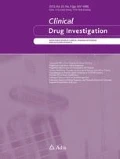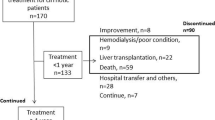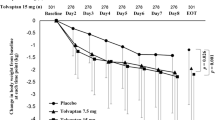Abstract
Objective
Midodrine is an α-agonist prodrug of desglymidodrine used for the management of hypotension, and can also be used for hepatorenal syndrome and cirrhotic patients with tense ascites. The objective of the present work was to study the clinical pharmacokinetic parameters of midodrine and its active metabolite desglymidodrine in cirrhotic patients with tense ascites, which may help in dose selection and improve treatment outcome.
Method
This was a prospective, open-label, single-dose, parallel-group study. At first, a pilot study was performed on one healthy volunteer by taking serial blood samples at scheduled time intervals to validate the method of analysis and sampling times. The full study was then conducted by selecting 12 cirrhotic patients with tense ascites in one group and taking nine blood samples. We also selected five healthy volunteers as the control group and took 11 blood samples.
Results
Statistically significant differences were observed between the healthy volunteer group and the patients group in the area under the concentration versus time curve (AUC0–t ) and maximum plasma concentration (C max) values of midodrine and desglymidodrine. Based on the results of the pharmacokinetic analysis, the patient group was further subdivided into those receiving the interacting drug ranitidine (five patients) and those not receiving the interacting drug (seven patients).
Conclusions
Pharmacokinetic parameters of midodrine can differ significantly in cirrhotic patients with tense ascites from those in healthy individuals. Drug monitoring, dose adjustments, and drug–drug interactions should all be considered during therapy in this vulnerable patient group.


Similar content being viewed by others
References
Prakash S, et al. Midodrine appears to be safe and effective for dialysis-induced hypotension: a systematic review. Nephrol Dial Transpl. 2004;19:2553–8.
Shire US Inc. ProAmatine (midodrine hydrochloride) tablets: prescribing information. Newport (KY): Shire US Inc.; 2003.
Akimoto M, et al. The in vitro metabolism of desglymidodrine, an active metabolite of prodrug midodrine by human liver microsomes. Eur J Drug Metab Pharmacokinet. 2004;25:865–77.
McClellan KJ, et al. Midodrine: a review of its therapeutic use in the management of orthostatic hypotension. Drugs Aging. 1998;12:76–86.
Naschitz J, et al. Midodrine treatment for chronic fatigue syndrome. Postgrad Med J. 2004;80(942):230–2.
Sra J, et al. Efficacy of midodrine in neurocardiogenic syncope refractory to standard therapy. J Cardiovasc Electrophysiol. 1997;8:42–6.
Low PA, et al. Efficacy of midodrine vs placebo in neurogenic orthostatic hypotension. A randomized, double blind multicentre study by the Midodrine Study Group. JAMA. 1997;277:1046–51.
Kuriachan V, et al. Evidence-based treatment for vasovagal syncope. Heart Rhythm. 2008;5:1609–14.
Quingou Z, et al. The efficacy of midodrine hydrochloride in the treatment of children with vasovagal syncope. J Pediatr. 2006;149:777–80.
Gupta V, Lipsitz LA. Orthostatic hypotension in the elderly: diagnosis and treatment. Am J Med. 2007;120:841–7.
Paling D, et al. Midodrine hydrochloride is safe and effective in older people with neurocardiogenic syncope. J Am Geriatr Soc. 2010;58:2026–7.
Perazella MA. Efficacy and safety of midodrine in the treatment of dialysis-associated hypotension. Expert Opin Drug Saf. 2003;2:37–47.
Barber DB, et al. Midodrine hydrochloride and the treatment of orthostatic hypotension in tetraplegia: two cases and a review of the literature. Spinal Cord. 2000;38:109–11.
Wecht JM, et al. Effects of midodrine hydrochloride on blood pressure and cerebral blood flow during orthostasis in persons with chronic tetraplegia. Arch Phys Med Rehab. 2010;91:1429–35.
Falk RH. Diagnosis and management of the cardiac amyloidoses. Circulation. 2005;112:2047–60.
Piwinski SE, et al. A comparison of post space flight orthostatic intolerance to vasovagal syncope and autonomic failure and the potential use of the alpha-agonist for these conditions. J Clin Pharmacol. 1994;34:466–71.
Such J, Runyon BA. Treatment of diuretic-resistant ascites in patients with cirrhosis. In: Travis (ed). Up to date. http://www.uptodate.com/contents/ascites-in-adults-with-cirrhosis-diuretic-resistant-ascites+&cd=2&hl=en&ct=clnk&gl=eg. Accessed 19 Dec 2014.
Ali A, et al. Clinical study on the therapeutic role of midodrine in non-azotemic cirrhotic patients with tense ascites: a double-blind, placebo-controlled, randomized trial. Hepatogastroenterology. 2014;61:1915–24.
Carlson RV et al. The revision of the Declaration of Helsinki: past, present and future. Br J Clin Pharmacol. 2004;57(6):695–713.
Grobecker HF, Kees F. Pharmacokinetic parameters and haemodynamic actions of midodrine in young volunteers. Int Angiol. 1993;12:119–24.
Ali A, et al. Development and validation of LC–MS/MS assay for the determination of the prodrug midodrine and its active metabolite desglymidodrine in plasma of ascitic patients: application to individualized therapy and comparative pharmacokinetics. J Chromatogr B. 2015;1(991):34–40.
DailyMed. http://dailymed.nlm.nih.gov/dailymed/drugInfo.cfm?id=31527. Accessed 11 June 2014.
Karwa R, Woodis B. Midodrine and octreotide in treatment of cirrhosis-related hemodynamic complications. Ann Pharmacother. 2009;43:692–9.
George J, et al. Differential alterations of cytochrome P450 proteins in livers from patients with severe chronic liver disease. Hepatology. 1995;21:120–8.
Bjornsson TD, et al. The conduct of in vitro and in vivo drug-drug interaction studies: a Pharmaceutical Research and Manufacturers of America (PhRMA) perspective. Drug Metab Dispos. 2003;31(7):815–32.
Author information
Authors and Affiliations
Corresponding author
Ethics declarations
Funding
This study was self-funded.
Conflicts of interest
Ahmed Ali, Samar Farid, Mona Amin, Mohamed Kassem, Nouman Al-Garem, and Medhat Al-Ghobashy have declared that there are no conflicts of interest.
Ethical approval
The Research Ethics Committee of the Faculty of Pharmacy, Cairo University, Cairo, Egypt (ethical registration number PI 951).
Electronic supplementary material
Below is the link to the electronic supplementary material.
Rights and permissions
About this article
Cite this article
Ali, A., Farid, S., Amin, M. et al. Comparative Clinical Pharmacokinetics of Midodrine and Its Active Metabolite Desglymidodrine in Cirrhotic Patients with Tense Ascites Versus Healthy Volunteers. Clin Drug Investig 36, 147–155 (2016). https://doi.org/10.1007/s40261-015-0359-6
Published:
Issue Date:
DOI: https://doi.org/10.1007/s40261-015-0359-6




